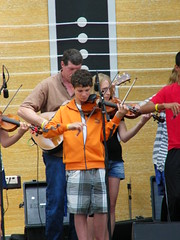 Image via Wikipedia
Image via WikipediaThis is the second post in the series on bullying. The first post last week looked at the current news on the subject. Today we will look at some of the basic bullying caselaw. Next week we will look at some of the recent caselaw.
Here are the cornerstone cases:
In Shore Regional High Sch Bd. of Educ v. P.S. 41 IDELR 234, 381 F.3d 194, (3d Cir. 8/30/04), the Third Circuit held that the school district’s failure to stop bullying may constitute a denial of FAPE. Bullies constantly called the student names, threw rocks and hit him with a padlock. Despite repeated complaints, the bullying continued and the student eventually attempted suicide. This was the first case at the federal appellate level to analyze bullying under IDEA. You can read the opinion by then Circuit Judge Alito here.
In Lillbask ex rel Mauclaire v. State of Connecticut Dept. of Educ. 397 F.3d 77, 42 IDELR 230 (2d Cir. 2/2/05). The Second Circuit Court of Appeals ruled that an IDEA hearing officer has the authority to review IEP safety concerns. The court provided an expansive interpretation of the jurisdiction of the hearing officer, ruling that Congress intended the hearing officer to have authority over any subject matter that could involve a denial of or interference with a student’s right to receive FAPE, including safety concerns that might affect receipt of FAPE.
See also, Preschooler II v. Clark County Sch Bd of Trustees 47 IDELR 151, 479 F.3d 1175 (9th Cir. 3/21/7); Stringer v. St. James R-1 Sch. Dist. 45 IDELR 179, 466 F.3d 799 (8th Cir. 5/3/6); Scruggs v. Meriden Bd. of Educ. 44 IDELR 59 (D.Conn. 8/22/05); RP & MP ex rel KP v. Springdale Sch Dist 107 LRP 9778(W.D. Ark 2/21/7); Walden v. Moffett 46 IDELR 159(E.D.Calif 8/28/6).
Other courts have ruled that in certain cases involving bullying, the parent may not have to exhaust administrative remedies before proceeding to court to pursue possible money damages. See, Blanchard v. Morton Sch. Dist. 420 F.3d 918, 44 IDELR 29 (9th Cir. 8/19/05); Walden v. Moffett 46 IDELR 159 (E.D. Calif 8/28/6); Scruggs v. Meriden 44 IDELR 59 (D.Conn 8/22/05).
These issues may well transcend special education. The Columbine tragedy raised our national consciousness concerning bullying and harassment of all kinds in the schools. The issue, however, has a big impact upon special education. Many children with disabilities report that they have been bullied.





















